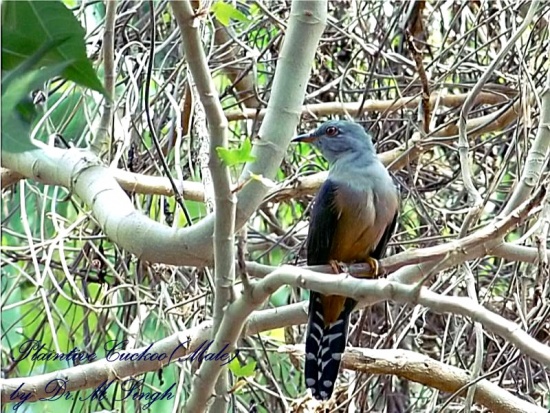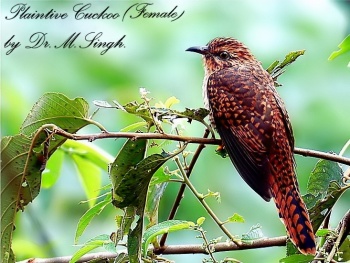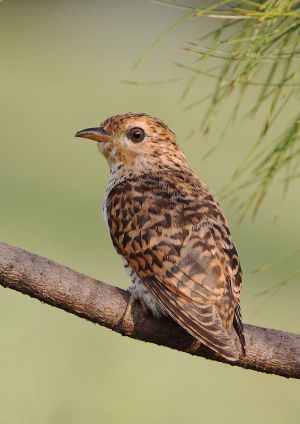m (Changed copyright to the late Dr Manjeet Singh) |
|||
| (17 intermediate revisions by 10 users not shown) | |||
| Line 1: | Line 1: | ||
| − | + | [[Image:Plaintive_Cuckoo.jpg|thumb|550px|right|ssp ''threnodes''<br />Photo © by the late | |
| − | [[Image:Plaintive_Cuckoo.jpg|thumb|550px|right|Photo by | + | [https://www.birdforum.net/gallery/users/dr-manjeet-singh.21146/ Dr Manjeet Singh]<br/>Pandamaran-jaya, P. Klang, [[Malaysia]], October 2006]] |
| − | + | '''Alternative name: Rufous-bellied Plaintive Cuckoo; Grey-breasted Brush Cuckoo (merulinus)''' | |
| + | ;[[:Category:Cacomantis|Cacomantis]] merulinus | ||
==Identification== | ==Identification== | ||
| − | + | [[Image:Plaintive_Cuckoo_female.jpg|thumb|350px|right|Female rufous morph<br />Photo © by the late | |
| − | has | + | [https://www.birdforum.net/gallery/users/dr-manjeet-singh.21146/ Dr Manjeet Singh]<br/>[[Malaysia]], November 2006]] |
| − | + | 18 - 23.5cm | |
| − | + | * Pale grey head, throat and upper breast | |
| + | * Dark brown upperparts lightly glossed green | ||
| + | * Blackish tail with white tip | ||
| + | * Rufous buff lower breast; ''querulus'' has rufous up to throat; ''lanceolatus'' has only some rufous wash on lower belly | ||
| + | Females are similar but can also occur in a rufous morph, bright rufous above, barred with black, a plain rufous tail, throat and breast and dark-barred whitish rest of underparts.<br /> | ||
| + | Juveniles are variable, some are all dark grey, others rufous. | ||
| + | ====Similar species==== | ||
| + | [[Grey-bellied Cuckoo]] has all grey underparts and dark grey upperparts. However, the songs are the same and juveniles look very similar. | ||
| + | [[Image:JuvPlaintiveCuckoo.jpg|thumb|300px|right|juvenile<br />{{user|chrisli|chrisli}}<br/>[[Singapore]], September, 2009]] | ||
==Distribution== | ==Distribution== | ||
| − | + | From the eastern [[Himalayas]] to southern [[China]] through Southeast [[Asia]] to the Greater Sundas, and | |
| − | + | [[Sulawesi]]. Resident in [[Malaysia]].<br /> | |
| − | Sulawesi. Resident in Malaysia | + | Common to very common in most of its range. |
| − | |||
==Taxonomy== | ==Taxonomy== | ||
| + | [[Grey-bellied Cuckoo]] is sometimes considered conspecific. | ||
| + | ====Subspecies<sup>[[#References|[1]]]</sup>==== | ||
| + | *''C. m. querulus'' from the eastern Himalayas to southern [[China]], [[Burma]], peninsular [[Malaysia]] and [[Indochina]] | ||
| + | *''C. m. threnodes'' in southern [[Malaysia]]n peninsula, [[Sumatra]] and [[Borneo]] | ||
| + | *''C. m. lanceolatus'' in [[Java]], [[Sulawesi]] and Togian Islands | ||
| + | *''C. m. merulinus'' in the [[Philippines]] | ||
==Habitat== | ==Habitat== | ||
| − | Found in the forest edge, scrub and | + | Found in the forest edge, scrub and plantations frequenting the crown of tall trees. |
| − | plantations frequenting the crown of tall trees. | ||
==Behaviour== | ==Behaviour== | ||
| − | + | ====Diet==== | |
| − | + | Feeds on insects, mainly on hairy caterpillars. Takes also some fruit.<br /> | |
| − | followed by a rapidly descending sequence of slurred whistling notes. | + | Forages often in canopy. |
| + | ====Breeding==== | ||
| + | Breeding season from May to June in [[Borneo]], April to August in northern [[Thailand]]. A brood parasitic. Known host species are [[Ashy Prinia]], [[Common Tailorbird]], [[Yellow-bellied Prinia]], [[Zitting Cisticola]] and [[Yellow-bellied Prinia]]. Evicts host's eggs | ||
| + | ====Movements==== | ||
| + | Resident and seasonally migratory. Present February to October in southwest China, resident in southern parts of range. | ||
| + | ====Vocalisation==== | ||
| + | Very vocal with it typical 3 note whistle followed by a rapidly descending sequence of slurred whistling notes. | ||
| + | ==References== | ||
| + | #{{Ref-Clements6thAug19}}#{{Ref-HBWVol4}} | ||
| + | {{ref}} | ||
| + | ==External Links== | ||
| + | {{GSearch|"Cacomantis merulinus" {{!}} "Plaintive Cuckoo" {{!}} "Rufous-bellied Plaintive Cuckoo" {{!}} "Grey-breasted Brush Cuckoo"}} | ||
| + | {{GS-checked}}1 | ||
| + | <br /> | ||
| + | <br /> | ||
| − | + | [[Category:Birds]] [[Category:Cacomantis]] | |
| − | |||
| − | |||
| − | |||
| − | [[Category: | ||
Latest revision as of 20:48, 18 December 2023
Alternative name: Rufous-bellied Plaintive Cuckoo; Grey-breasted Brush Cuckoo (merulinus)
- Cacomantis merulinus
Identification
18 - 23.5cm
- Pale grey head, throat and upper breast
- Dark brown upperparts lightly glossed green
- Blackish tail with white tip
- Rufous buff lower breast; querulus has rufous up to throat; lanceolatus has only some rufous wash on lower belly
Females are similar but can also occur in a rufous morph, bright rufous above, barred with black, a plain rufous tail, throat and breast and dark-barred whitish rest of underparts.
Juveniles are variable, some are all dark grey, others rufous.
Similar species
Grey-bellied Cuckoo has all grey underparts and dark grey upperparts. However, the songs are the same and juveniles look very similar.
Distribution
From the eastern Himalayas to southern China through Southeast Asia to the Greater Sundas, and
Sulawesi. Resident in Malaysia.
Common to very common in most of its range.
Taxonomy
Grey-bellied Cuckoo is sometimes considered conspecific.
Subspecies[1]
- C. m. querulus from the eastern Himalayas to southern China, Burma, peninsular Malaysia and Indochina
- C. m. threnodes in southern Malaysian peninsula, Sumatra and Borneo
- C. m. lanceolatus in Java, Sulawesi and Togian Islands
- C. m. merulinus in the Philippines
Habitat
Found in the forest edge, scrub and plantations frequenting the crown of tall trees.
Behaviour
Diet
Feeds on insects, mainly on hairy caterpillars. Takes also some fruit.
Forages often in canopy.
Breeding
Breeding season from May to June in Borneo, April to August in northern Thailand. A brood parasitic. Known host species are Ashy Prinia, Common Tailorbird, Yellow-bellied Prinia, Zitting Cisticola and Yellow-bellied Prinia. Evicts host's eggs
Movements
Resident and seasonally migratory. Present February to October in southwest China, resident in southern parts of range.
Vocalisation
Very vocal with it typical 3 note whistle followed by a rapidly descending sequence of slurred whistling notes.
References
- Clements, J. F., T. S. Schulenberg, M. J. Iliff, S. M. Billerman, T. A. Fredericks, B. L. Sullivan, and C. L. Wood. 2019. The eBird/Clements Checklist of Birds of the World: v2019. Downloaded from http://www.birds.cornell.edu/clementschecklist/download/
- Del Hoyo, J, A Elliot, and J Sargatal, eds. 1997. Handbook of the Birds of the World. Volume 4: Sandgrouse to Cuckoos. Barcelona: Lynx Edicions. ISBN 978-8487334221
Recommended Citation
- BirdForum Opus contributors. (2024) Plaintive Cuckoo. In: BirdForum, the forum for wild birds and birding. Retrieved 8 June 2024 from https://www.birdforum.net/opus/Plaintive_Cuckoo
External Links
GSearch checked for 2020 platform.1






